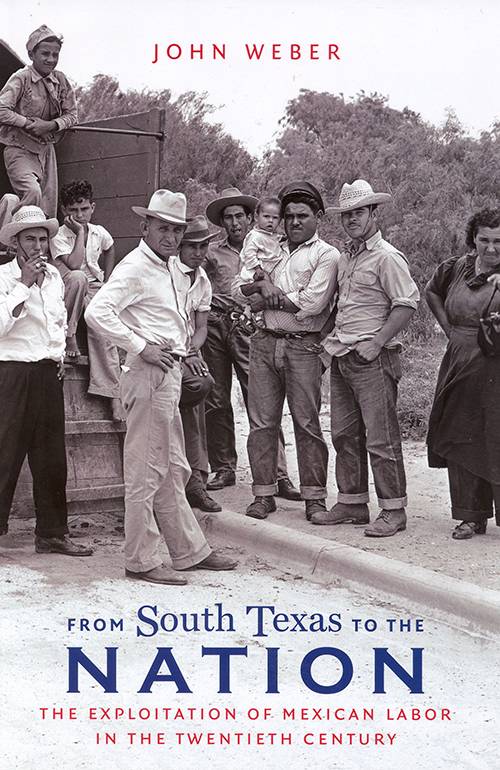Strong

From South Texas to the Nation: The Exploitation of Mexican Labor in the Twentieth Century
by John Weber
Chapel Hill: The University of North Carolina Press, 2015
336 pp. $34.95 cloth
Reviewed by
Joseph Orbock Medina
Several generations of scholars have written on the Mexican labor regime in South Texas, especially in the Rio Grande Valley. Those studying Texas and low-wage labor are familiar with the interpretive lenses of world systems structuralists, whiteness scholars, Chicano experts, and a cavalcade of others recognizing the transformative socioeconomic patterns of this region in the twentieth century. Aside from the seminal works by Zamora, Foley, and Montejano, however, few histories of Mexican labor in Texas reach beyond the purview of specialists. On first glance, it is clear that John Weber treads on some familiar ground in From South Texas to the Nation. Rather than a simple corollary, he has produced a magnificent and timely revision of mostly known events by persistently centering the state apparatus as his mode of interpretation. Weber also provides much needed updates to the aged classic literature by contextualizing the prevailing South Texas scholarship with recent innovations in borderlands studies.
This focus on the state facilitates a clear narrative of South Texas labor and the expansion of low-wage, malleable, ethnic labor doctrine throughout the United States. Though Skocpolian theory and Ngai’s path-breaking conclusions on imported labor are old news to the academy, Weber’s account is perhaps the most lucid and convincing in applying these ideas to the South Texas construction and export of Mexican labor systems. His purpose is to demonstrate the role of the state in perpetuating agricultural producer’s framing of economic reality. From South Texas to the Nation convincingly argues that although employment is a two-way interaction, it is Mexican workers who must bear the social and political costs in a system legally and politically streamlined to benefit employers. With state-backed mitigation of risk to American employers, the exploitative salience of the model persists to the present.
While early twentieth century Mexican history is a complicated amalgamation of contingency and ancient colonial reckoning, From South Texas to the Nation is so well-written that even those ignorant of Mexican history will follow along with ease. Readers will appreciate the Texas-Mexico border as a tool for pragmatic thinkers on both sides, instead of a site of marked separation between distinct polities. Weber rightly presents Mexican labor in the United States as a function of economic and political developments on both sides of the border. His erudite account of the Porfiriato and Mexican Revolution conditions the reader to appreciate the convergence of transnational factors feeding the South Texas labor machine.
Some aspects of Weber’s work do beg critique. As with most American scholars, the presentation of Mexicans as a cohesive group in the United States sometimes slides into a reflection of Anglo lumping and “othering” of unfathomably diverse peoples. Weber is, of course, cognizant of Mexican (and Mexican American) stratification along ethnic, ideological, and cultural axes—his prevailing focus occasionally betrays this subtlety. Though not undermining his claims regarding institutions, the deep intellectualism and transformation of Latino public spheres in the twentieth century are not fully expressed. The book only contains a vague sensibility regarding the internal Mexican American politics divided between economic and social conservatives and their rivals who were chiefly union-friendly progressives.
Weber is careful to utilize and recognize the stalwarts of Texas-Mexican history in his text. This allows him to synthesize some of the most relevant, prevailing ideas in this field, but historiographical debates are conspicuously limited in the main text. Weber’s endnotes reveal much more complexity, especially in terms of formative events, such as the fallout around the notorious Plan de San Diego. Readers will need to carefully flip back and forth to the notes in order to situate the patently Texan historiography. Other major Mexican American entities with implication for Mexican Labor are nearly absent (e.g. The American G.I. Forum.) Some relevant scholars, such as Richard Ribb, and crucially significant historical figures, such as J.T.Canales, are mentioned in passing without the expected notational or bibliographic information. Weber is quick to positively portray the contributions of other scholars, but often readers will be left to infer historiographical contentions and revisions themselves. Mexican American experts may also question the glossing over of many twentieth century Texas-Mexican developments.
Editorial mandates likely contributed to some of the aforementioned concerns, but there is also a particular genius to a narrative driven forward by employers and the state. Experts on Texas may lament the coverage of famous Texas-Mexican episodes, but the dogged focus on the state apparatus is what permits Weber to achieve his goals for a broad academic audience. Though this book does not have the scope and explanatory power for Texas that are encapsulated in works such as David Montejano’s Anglos and Mexicans in the Making of Texas, Weber’s work fully deserves a space on the shelf next to the great books on Texas and Mexican Americans. The criticisms mentioned here are not meant to dissuade attention from this scholarship. In fact, it is probably just for Texaphiles to sacrifice our pedantic focus for the purpose bolstering Texas scholarship to the appropriate position in broader academia. From South Texas to the Nation unquestionably deserves a wide readership. Specialists in several sub-fields will find Weber’s analysis useful and perhaps indispensable. For novices, the cogent explanations and pleasant writing should be a welcome relief from most academic writing. Expect to see this monograph cited often and its form emulated.
Joseph Orbock Medina is a lecturer at California State University, Fresno. He is a graduate of Texas State University-San Marcos, the University of Texas at Austin, and The University of California, Berkeley.
